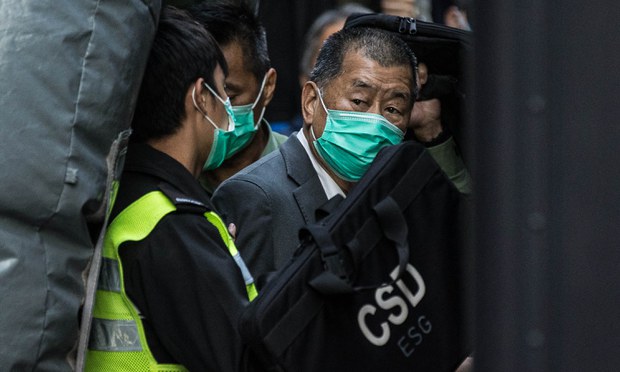Authorities in Hong Kong on Friday froze the personal assets of jailed pro-democracy media mogul Jimmy Lai, under new powers granted to police under a national security law, and amid an ongoing crackdown on public dissent and political opposition in the city.
Lai, who is currently serving a 14-month jail term for taking part in “illegal assemblies” during the 2019 protest movement, is also awaiting trial on charges of “collusion with foreign powers” under the law.
Lai’s 71-percent stake in the Next Digital media conglomerate he founded, along with property in local banks of three companies owned by him were frozen under Article 43 of the National Security Law for Hong Kong, the city’s Security Bureau said.
It also warned: “Relevant persons and organizations must not, directly or indirectly, deal with certain property which is reasonably suspected to be related to offenses endangering national security.”
Hong Kong police’s national security department brought one charge of collusion with a foreign power to endanger national security against Lai on Dec. 11, 2020, and a further two charges of conspiracy to commit the same offense were brought on April 16, 2021.
Hong Kong’s Secretary for Security has the power under the national security law to order police officers to seize property if they suspect it may be removed from the city.
The Next Media staff union said it was monitoring the situation closely, although the company said it didn’t expect its day-to-day operations to be affected.
A bad precedent
New York-based civil rights lawyer Ye Ning said the move has set a bad precedent.
“Maintaining freedom of speech is one of the duties set out in Article 19 of the U.N. Universal Declaration of Human Rights, to which the People’s Republic of China is a party,” Ye told RFA. “And yet the [ruling] Chinese Communist Party (CCP) has yet to achieve this at any point in its history.”
“This is serious, because it is an unprecedented move in the context of international norms, because newspapers and the media make a living with words,” he said.
“The U.S. has also frozen assets before, usually of individuals or groups that use weapons or explosives to endanger civilian lives,” Ye said. “Now it is the assets of the media, newspapers [and their owners] that are being frozen.”
“These are purely ideological crimes in the eyes of the CCP … which is turning Hong Kong into Shanghai in 1949 [shortly after the CCP took power].”
Bruce Lui, senior journalism lecturer at the Hong Kong Baptist University, said the move would definitely be a blow to Next Media’s flagship Apple Daily newspaper.
“Lai’s jailing has been of huge concern for the entire group, with an impact on staff morale as well as its income stream sustainability,” Lui said.
“From a business point of view, the big banks could change the terms of their operations with the group, for example calling in debt or raising interest rates.”
Academic freedom concerns
The draconian national security law imposed on the city by the ruling Chinese Communist Party in July 2020 has also sparked growing concern in Hong Kong that academic freedom is being compromised, according to a new survey.
Based on responses to emailed questionnaires sent to 7,216 people, the Hong Kong Public Opinion Research Institute (PORI) found that a majority of adult respondents were concerned for academic freedom in the city.
Six out of 10 respondents said they believed that there are now restrictions on academic freedom at the city’s colleges and universities, the report said.
Meanwhile, only 26 percent of respondents believed that there are now fewer restrictions on academic life, while 45 percent said they didn’t think university management was working hard to protect academic freedom.
A number of colleges and universities have banned campus activities since the national security law took effect, and censored the content of protest messages that appear on their property.
The Chinese University of Hong Kong reported banners it said were “pro-independence” to police during a graduation ceremony, while it and the University of Hong Kong have severed ties with their student unions, citing their political activism.
John Tse, associate social science professor at Hong Kong’s City University, said many of the provisions in the national security law are vague, making it easy for the authorities to interpret them to suit a given situation.
He said lecturers and teachers are now having their classes recorded, putting them in constant fear of saying the wrong thing.

